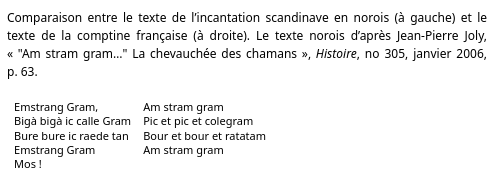Italian Translation
Come fai la conta?
Aria and ChatGPT say this sentence is incorrect. Any ideas?
Come fai la conta?
Aria and ChatGPT say this sentence is incorrect. Any ideas?
The sentence page on Tatoeba is original and only has translations to Italian, so it’s hard to tell. Does the Italian mean “How do you count?”
I looked up “fare la conta”:
conta sf
(nei giochi) fare la conta to see who is going to be ‘it’
Could this be golf related?
Much more likely, the French sentence was meant to be: Comment comptes-tu ?, matching the Italian.
But the French sentence is the original, and the Italian is a translation from that.
The french sentence doesn’t make sense to me, but I found out that “poter” can supposedly be used as a verb in the context of golf, or to mean “boire un pot” (to have a drink), in belgian French.
https://fr.wiktionary.org/wiki/poter
What makes this even more “interesting” is that “poter” is apparently an Italian verb, which means “can/be able to”…
Do you @Anxos @Konsa @morbrorper know for sure what the Italian translation means?
I think this is one of those sentences where it’s best to just press the “Ignore Sentence” button ![]() .
.
This verb doesn’t appear to have any other sentences related to it on Tatoeba, and is only translated into one other language. It therefore seems to me that it is a sentence that would not cause any problems if it were instantly forgotten.
Now, as to what this might actually mean …
Well, on the Tatoeba page for this sentence, the author of the sentence (our regular French contributor known as “sacredceltic”) provides a hint in the comments as to where this might come from. The link points to a children’s rhyme for selecting someone (as suggested by @morbrorper with the Italian translation). This is similar to the English rhyme beginning “Eeny, meeny miny, moe …”.
On the interweb I can find a Belgian site which has a collection of children’s rhymes and is titled “Piss’ piss’ pote la carotte”. The collection is described as “Récolte de chansons enfantines en quatorze langues différentes …”. This is also referenced on another site called Les Grand Lunaires.
Then there is also a mention of the verb “pispoter (dans la langage belge)” on an old newsgroup archive.
So, it appears to be something from Belgium related to a children’s nursery rhyme.
Therefore, I will repeat my suggestion that this sentence is a good candidate to have the “Ignore Sentence” button applied.
P.S.
When a native speaker says that a sentence doesn’t make sense to them, then I always consider that to be a very strong reason to just click “Ignore Sentence”.
Very impressive detective work indeed!
I agree that this sentence should probably be ignored, but fwiw, I think you are right.
The French version would be: Am, stram, gram, pic et pic et colégram, bour et bour et ratatam, am, stram, gram. - French example sentence - Tatoeba
"Am, Stram, Gram…", which we indeed sung when we were kids.
Fun fact: These words don’t make any sense in French either… ![]()
They may actually be derived from German “eins, zwei, drei”, or possibly from Old Norse:

@zzcguns : Thanks for the deep dive… I was pretty far off with my “golf hypothesis”… ![]()